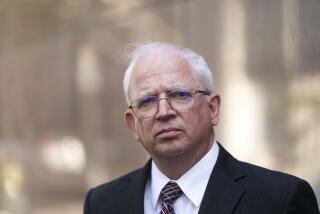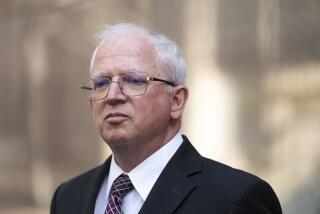Waxman Queries NIH on Researcher’s Ties
WASHINGTON — Calling the issues “serious,” Rep. Henry A. Waxman (D-Los Angeles) has posed detailed questions to the head of the National Institutes of Health concerning the financial ties between the government’s top diabetes researcher and a major pharmaceutical company.
In a letter to Dr. Harold E. Varmus, the NIH director, Waxman seeks explanations for how the researcher--who oversees the government’s largest study of diabetes--received thousands of dollars from the company, whose drug was used in the study.
The consulting arrangements between the NIH diabetes researcher, Dr. Richard C. Eastman, and New Jersey-based Warner-Lambert Co., were disclosed Monday by The Times.
“The issues raised by the Los Angeles Times are serious and implicate the health and safety of the participants of the [NIH] trial, as well as Americans with diabetes,” Waxman wrote to Varmus.
Waxman added in an interview: “It seems to me very important that NIH clear up any questions about the propriety of Dr. Eastman’s situation quickly. This diabetes-prevention study is very important and any possibility of improper conflicts of interest should be refuted at the earliest possible time.”
The congressman said that he expects Varmus to respond within the next two weeks. Waxman is the ranking Democratic member of the House Government Reform and Oversight Committee.
Warner-Lambert makes the diabetes pill Rezulin--one of two drugs selected by NIH officials for inclusion in the $150-million Diabetes Prevention Program. After an extensive and at-times stormy evaluation spanning nearly two years, Rezulin and one other drug were selected in mid-1996 for testing in the study.
Rezulin was withdrawn from the study in June of this year, after the liver failure and death of a 55-year-old East St. Louis, Ill., high school teacher, who had been taking Rezulin as a volunteer participant.
According to interviews and company records, Eastman entered a formal consulting arrangement with Warner-Lambert on Nov. 1, 1995. As recently as September 1997, Eastman also was a paid “faculty” member of Warner-Lambert’s “Rezulin National Speakers Bureau,” a group that encourages physicians to use the drug.
Eastman, who in his own words has had “overall global responsibility” for the NIH diabetes study, has acknowledged that he participated in a continuum of deliberations concerning use of the drug.
These discussions included both the selection of Rezulin and decisions to keep the drug in the study after patient deaths in the United States and Japan that prompted authorities and Warner-Lambert to recommend regular liver-function testing of patients. In Britain, the drug was withdrawn last December.
The Times reported on Sunday that, since coming on the market as a prescription pill for adult-onset diabetes, Rezulin has been linked to the liver-failure deaths of 33 patients, according to the Food and Drug Administration.
Eastman, 52, has said that he abstained from one or more final votes to select Rezulin for the diabetes study. Both Eastman and one of his superiors also told The Times that Eastman’s arrangements with Warner-Lambert were approved and did not, in their view, pose a conflict of interest.
Eastman has declined to specify the amount he has been paid by the company, placing the figure in the “thousands” of dollars. He said that he had received more than $150 an hour for serving on the “education council” of a separate group financed by Warner-Lambert, called the National Diabetes Education Initiative.
Officials at NIH so far have declined to release financial disclosure records that would show the value of Eastman’s compensation from Warner-Lambert.
Among other things, Waxman asked Varmus how much compensation Eastman had received from Warner-Lambert for 1995, 1996 and 1997. Waxman’s letter was sent to Varmus Monday evening.
Varmus, an appointee of President Clinton, has not responded to questions posed by The Times about Eastman’s dual roles for the government and Warner-Lambert.
Anne Thomas, a spokeswoman at the NIH, said that Varmus would respond to Waxman’s letter.
Federal law makes it a crime for a high-ranking public official to have a financial arrangement with a company while participating “personally and substantially” in government matters that affect the company.
Moreover, federal ethics guidelines that govern NIH officials disallow an outside employer from referring to the official “in anything distributed for publicity or product promotion.”
On June 11, 1996, Warner-Lambert issued a press release announcing the NIH’s selection of Rezulin for the diabetes study. The release quoted one official--Eastman.
More to Read
Sign up for Essential California
The most important California stories and recommendations in your inbox every morning.
You may occasionally receive promotional content from the Los Angeles Times.











